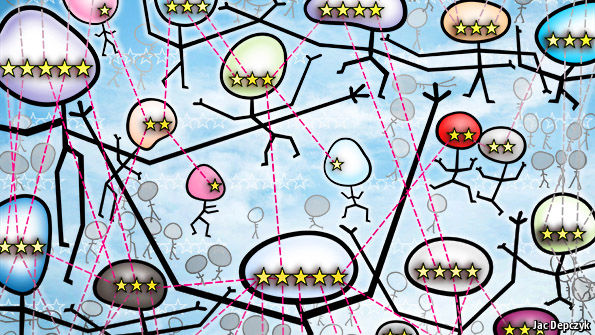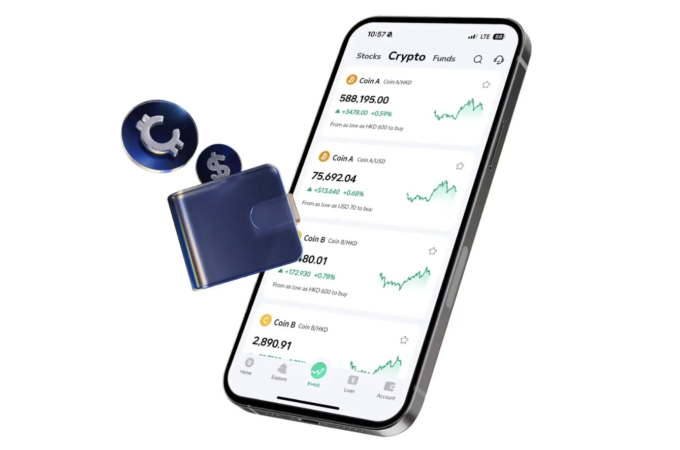
Believing is seeing
By Economist
IT IS easy to forget that even the most trivial commercial transactions rely on small acts of trust. Laws encourage good behaviour, but states lack the resources to force everyone to be good all the time. Trust keeps society running. Just ordering a pizza requires faith that the dough will be well made, that the pizzeria will not abuse the customer’s credit-card information, and that the delivery man will not abscond with the cargo. More complex partnerships, of the sort that make long-run economic growth possible, require much higher degrees of trust. New technologies, from sharing-economy apps to the blockchain, offer routes around some of the trust deficits that stand in the way of growth. Yet whether such solutions to problems of mistrust build on or undermine social ties is no easy question to answer.
Trust in society is not just a nicety. It makes possible, as one paper on the subject has it, “the commitment of resources to an activity where the outcome depends upon the co-operative behaviour of others”. Low-trust societies waste piles of time and money working out who can be counted on, defending vulnerable stores of wealth, and guarding against con men. Such places are infertile ground for long-run investment, the gains from which could be grabbed by rivals or stolen by government. Meanwhile trust is highest, and defences against chicanery lowest, within some of world’s wealthiest countries. Studies of the relationship between measures of trust and economic growth find a close link between the two. That does not necessarily mean one causes the other. But research also suggests that trust boosts trade, participation in financial markets and investment, suggesting that greater trust spurs the activities that make a place richer.=
Sadly, cultivating trust is hard. It is a sort of social capital which must be built through time and effort. Repeated positive interactions and demonstrations of trustworthiness create a foundation of mutual confidence. Within close communities, emotional cues like praise and shame effectively discourage antisocial activity. In environments rich in social capital, the return for co-operative behaviour is high; you can make more money playing by the rules and building a business, for instance, than by reneging on a contract at the first opportunity. In the same way, trustworthiness is rarely rewarded in low-trust societies; both high-trust and low-trust states of the world are sticky.
Inventive humans are good at finding ways around trust bottlenecks. Reliance on families or tribes—groups whose members’ interests are more closely aligned, presumably, than those of the population as a whole—is a common strategy. Yet by their nature, such workarounds are limited in scope, and leave many members of society isolated. New technologies offer a more promising approach. A company’s ability to use the internet to monitor production in a factory half a world away means that firms need not establish deep relationships with foreign suppliers before opening a distant plant. Network connections between retailers and banks can help verify a customer’s ability to pay; the blockchain, a shared, public and trusted digital ledger of transactions, eliminates the need for a central counterparty altogether.
These advances clear the way for new investments and purchases. Yet whether they are a long-run boon is harder to assess. In a world of big data, people might come to trust only what can be verified electronically. In a recent blog post, Branko Milanovic of The City University of New York lamented the “commodification” of labour made possible by market-making apps. Enabling strangers to quickly do business frees people of the need to be nice, he argues; their trust-building skills could atrophy. Similarly, Tyler Cowen of George Mason University recently mused that as people grow more accustomed to interacting with intelligent machines (like Apple’s Siri), which require no social niceties, they might find it harder to build relationships with humans. Technologies can perpetuate discrimination: algorithms used to make lending decisions or process human speech occasionally “learn” to become racist by analysing the data fed to them.
Computer says yes
Historically, however, technology has done more to open up society than to segregate it. New technologies make it easier to trust unfamiliar groups. Public ratings, for instance, can undercut discrimination. Taxi drivers who might normally speed past members of a different race may feel more comfortable picking up a diverse set of riders given good ratings on Uber. A survey conducted by BlaBlaCar, a popular ridesharing service, found that 88% of its members reported a high level of trust in fellow users—higher than that reported for colleagues or neighbours. In a study in America, Alberto Alesina, of Harvard University, and Eliana La Ferrara, of Bocconi University in Milan, found that places with higher levels of racial and income diversity have lower levels of trust. By arranging interactions across such boundaries, technology may widen the circle of trust.
Apps often encourage good behaviour as well. Public ratings, like the ones that Uber presents for its drivers or that Yelp collects for businesses, mean that good customer service is increasingly important in capturing new business. Firms and customers that behave badly risk a permanent stain on their reputation.
Reliance on a social panopticon to enforce good behaviour may not seem much like the sort of trust that underpins economic growth. It is one thing to use Airbnb to rent a spare room from someone of a different background, and quite another to build the deep social bonds needed to support long-run investments. For big commitments, people will not suddenly let down their guard, however impressive technology becomes. Yet trust is a habit. New technologies that encourage co-operation in some spheres of life contribute to social capital rather than weaken it.
First appeared at the Economist





